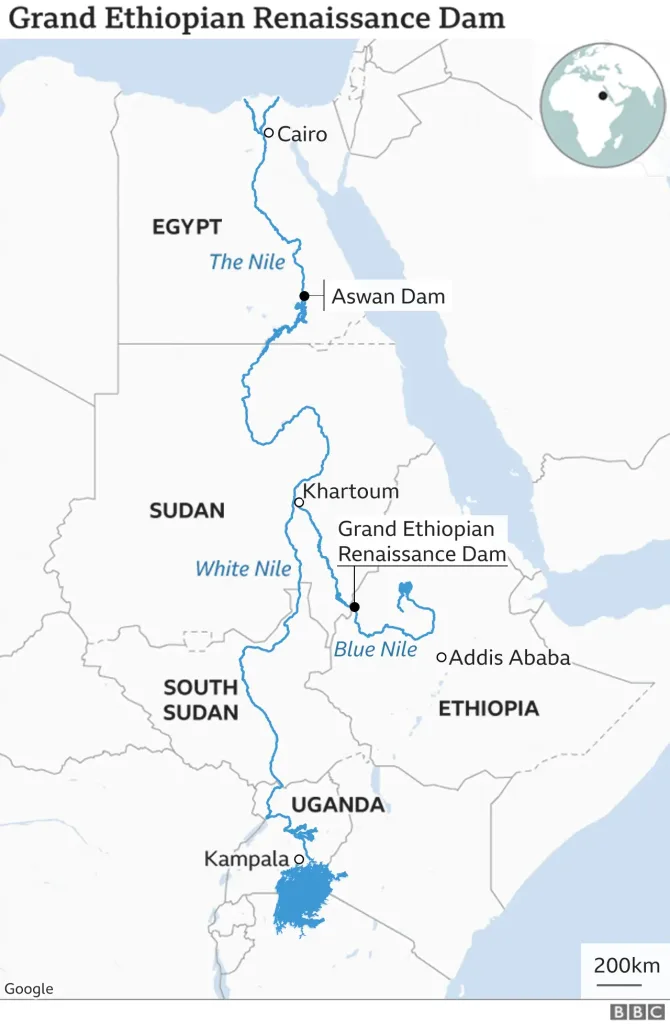London, UK, 2025-10-13
GEOPOLITICAL & WATER SECURITY REPORT
Reported By : Abeer Almadawy
The Nile Crisis has violently escalated, moving from a decade-long diplomatic stalemate to an immediate humanitarian and environmental threat. Following the unilateral inauguration of the Grand Ethiopian Renaissance Dam (GERD) in September 2025, Ethiopia’s subsequent uncoordinated operation of the dam’s gates has been directly blamed by Egypt for a sudden and severe late-season flood surge, submerging land and displacing thousands in both Sudan and Egypt. This reckless unilateral action has cemented Cairo’s worst fears regarding the long-term, critical dispute, adding a new dimension of immediate physical danger to the existential threat posed to Egypt’s water security.
Headline Points
* ‘Man-Made Flood’ Crisis: Egypt and Sudan have formally accused Ethiopia of “reckless unilateral management” of the GERD in October 2025, claiming unannounced water releases caused a “man-made, late flood” that devastated low-lying areas, particularly in Sudan and Egypt’s Nile Delta provinces of Menoufia and Beheira.
* Total Diplomatic Breakdown: The floods have solidified the diplomatic freeze, with Cairo and Khartoum condemning the uncoordinated operation as a flagrant violation of international law. Ethiopia dismisses the claims, asserting the GERD has actually mitigated worse flooding from heavy rains.
* Water Security and Operational Risk: The incident highlights Egypt’s primary security concern: that Ethiopia’s total control over the Blue Nile flow—both during drought and high-flow periods—threatens the stability of its vital water infrastructure and agricultural sector.
* Red Sea Port and Regional Tension: Ethiopia’s ongoing, aggressive pursuit of sovereign Red Sea access has been a major factor, leading to heightened tension and military posturing with neighbouring Eritrea. This wider geopolitical ambition is seen by critics as linked to a strategy to gain dominance over the Nile Basin.
* Geopolitical Conspiracy Claims: Long-circulating narratives in Egyptian media claim Ethiopia has a project to re-route Nile water to the Red Sea, potentially for sale to other states, with speculative reports pointing to cooperation with Saudi investors and alleged Israeli involvement.

The ‘Man-Made Flood’: An Immediate Danger
The long-feared consequences of the GERD’s unilateral operation materialised dramatically in late September and early October 2025. Days after Ethiopia’s formal inauguration of the dam, a massive and unannounced surge of water was released downstream.
Egypt’s Ministry of Water Resources and Irrigation officially blamed the resulting widespread flooding in Sudan and parts of the Egyptian Nile Delta on Ethiopia’s “irresponsible unilateral behaviour.” The ministry stated that the abrupt, non-coordinated releases strained Sudan’s Roseires Dam and forced Egypt to release larger-than-usual amounts of water from the Aswan High Dam to manage the pressure, a measure that still led to the inundation of farmland and homes in northern provinces like Menoufia and Beheira.
Ethiopia, in response, firmly rejected the accusation. Its Ministry of Water and Energy claimed that the GERD was, in fact, playing a beneficial role by regulating the flow and reducing the peak magnitude of the seasonal flood, arguing that heavy rains in the Ethiopian Highlands would have caused “historic destruction” without the dam’s attenuation effect.
This contradiction underscores the crisis: without a binding agreement on real-time data sharing and operational rules, any management decision by Ethiopia, whether to store or release water, is viewed by Cairo and Khartoum as a malicious or reckless act that directly threatens the lives and livelihoods of downstream citizens.
Geopolitical Narratives: Water, Ports, and External Powers
The water dispute has long been entangled with broader, speculative geopolitical narratives in the region.
The claim that Ethiopia plans to reroute or sell Nile water, specifically to Israel via the Red Sea, is a long-standing theory prominent in some Egyptian media and political circles. While official, public projects for such an initiative are non-existent, the underlying narrative accuses Ethiopia of using its dam for “evil behaviour” to prevent Egypt and Sudan from their rightful water share. This narrative often ties into:
* Alleged Israeli Involvement: Claims of Israeli technical expertise and political support for the GERD are frequent, interpreted in Cairo as part of a historical agenda to diminish Egypt’s water security. Israel’s embassy in Cairo has repeatedly denied any threat to Egypt’s water security.
* Saudi and Gulf Investment: Speculative reports linking the GERD to a future project of water transfer for sale—potentially involving Saudi investors and new Red Sea infrastructure—circulate amidst the backdrop of Ethiopia’s aggressive pursuit of Red Sea port access.
The Eritrea Tensions: Seeking a Port on the Red Sea
Ethiopia’s fervent quest for sovereign Red Sea access is an intrinsic part of its national security and economic policy, and this ambition has exacerbated tensions with its neighbour, Eritrea, further complicating the GERD dispute.
Prime Minister Abiy Ahmed has repeatedly framed Red Sea access as a strategic and even existential imperative for landlocked Ethiopia. This goal has led to:
* Somaliland Deal: Ethiopia’s controversial memorandum of understanding with the Somaliland region.
* Eritrea Standoff: The quest for a port has brought Ethiopia to the brink of conflict with Eritrea, which views Ethiopia’s ambition (often focused on the Eritrean port of Assab) as an act of aggression. Eritrea, in turn, has sought alliances, notably deepening ties with Egypt and Somalia, creating a new, volatile anti-Ethiopian alignment in the Horn of Africa.
Thus, the Nile Crisis is no longer just a water dispute; it is a complex vortex where the GERD’s unilateral operation, the recent, destructive flood surges, and Ethiopia’s desperate push for a Red Sea port all converge, escalating the potential for a wider, destructive conflict across the African-Arab regional divide. The diplomatic freeze remains, yet the hydrological and geopolitical floodgates have been thrown wide open.
